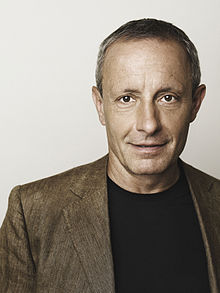Peter Pilz
Peter Pilz | |
|---|---|
 | |
| Member to the National Council | |
| In office 10 June 2018 – 29 September 2019 | |
| Affiliation | Peter Pilz List |
| In office 29 October 1999 – 8 November 2017 | |
| Nominated by | Johannes Voggenhuber |
| Affiliation | The Greens |
| In office 17 December 1986 – 8 December 1991 | |
| Affiliation | Green Alternative |
| Chairman of the Peter Pilz List | |
| In office 26 July 2017 – 20 August 2018 | |
| Preceded by | Office established |
| Succeeded by | Maria Stern |
| Spokesman of the Green Party | |
| In office 1992–1994 | |
| Preceded by | Johannes Voggenhuber |
| Succeeded by | Madeleine Petrovic |
| Personal details | |
| Born | 22 January 1954 Kapfenberg, Styria, Austria |
| Political party | JETZT; formerly known as Peter Pilz List (since 2017) |
| Other political affiliations | The Greens (before 2017) |
Peter Pilz (born 22 January 1954) is an Austrian politician (JETZT).[1] From 1986 to 2017, he was a member of the Austrian Green Party.
Political career
[edit]Born in Kapfenberg, Styria, Pilz has been a member of the Austrian Parliament (Nationalrat) between 1986 and 1991 and since 1999. From 1992 to 1994 he also was federal spokesperson of the Greens. His main area of interest is legal matters and political corruption. Commonly known wearing a black jacket and a red, grey or green T-shirt, he was the first Austrian politician to keep a blog on the Internet.
In January 2005, Pilz made international news when he called for Arnold Schwarzenegger to be stripped of his Austrian citizenship. As Governor of California, Schwarzenegger had refused to intercede in the execution of a convicted murderer, Donald Beardslee. Pilz pointed to an Austrian law which prohibits any Austrian from taking part in, or ordering, an execution.
A few months later, Pilz claimed that a person whom he called "Zeuge D" (German: "witness D") has information that Iranian president Mahmoud Ahmadinejad had participated in the murder of 3 Kurds in Vienna in 1989. According to him the Austrian police had already contacted the witness, who supposedly lived in France, but this was denied by the Austrian Ministry of Justice.
On 25 July 2017, with the disappointment of Green leadership and lack of responses in refugee and migrant crisis, he announced his independent campaign for the elections to the Austrian parliament in the autumn. He headed the Peter Pilz List, a group of intellectuals, artists and entrepreneurs, critical toward the establishment. His new party cleared the 4 percent threshold for entering parliament in the election and handed a major defeat to the Greens, whose support fell to 3.9 percent from more than 12 percent in 2013.[2]
On 4 November 2017, after sexual harassment allegations came to light, Pilz announced that he would not take his seat in the National Council, and the seat was assumed by Martha Bissmann.[3][4][5] On 22 May 2018, Pilz and his party announced that he would return to parliament before summer, as the trial against him had ended.[6]
Other activities
[edit]- SK Rapid Wien, member of the board of trustees[7]
References
[edit]- ^ Jenny, Marcelo (2019). "Austria: Political Developments and Data in 2018". European Journal of Political Research Political Data Yearbook. 58 (1): 21–29. doi:10.1111/2047-8852.12268. ISSN 2047-8852.
- ^ Cathy Buyck (November 4, 2017), Austrian party leader resigns over harassment accusations Politico Europe.
- ^ "Austrian politician resigns amid sexual harassment claims". Associated Press. 4 November 2017.
- ^ Peter Temel (4 November 2017). "Vorwurf der sexuellen Belästigung: Peter Pilz tritt zurück". Kurier. Retrieved 4 November 2017.
- ^ Liste Pilz hält Krisensitzung ab, Bißmann übernimmt Mandat. In: DiePresse.com. 4. November 2017, viewed 6. November 2017.
- ^ "Ermittlungen gegen Peter Pilz eingestellt".
- ^ 2016 Transparency Report National Council.
External links
[edit]- Pilz's political diary (in German)
- 1954 births
- Austrian male bloggers
- Critics of Islamism
- Living people
- Members of the 17th National Council (Austria)
- Members of the 18th National Council (Austria)
- Members of the 21st National Council (Austria)
- Members of the 22nd National Council (Austria)
- Members of the 23rd National Council (Austria)
- Members of the 24th National Council (Austria)
- Members of the 25th National Council (Austria)
- Members of the 26th National Council (Austria)
- People from Kapfenberg
- Sex scandals in Austria
- The Greens (Austria) politicians
- Austrian politician stubs
